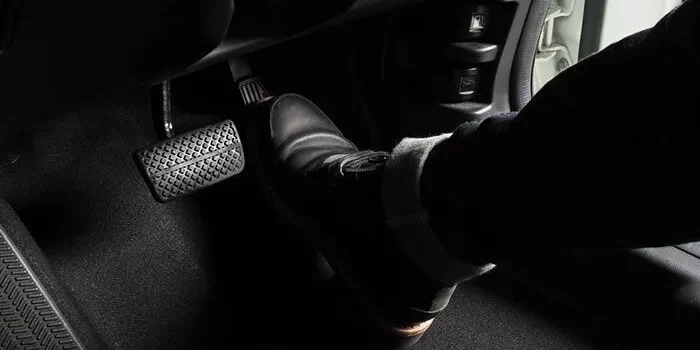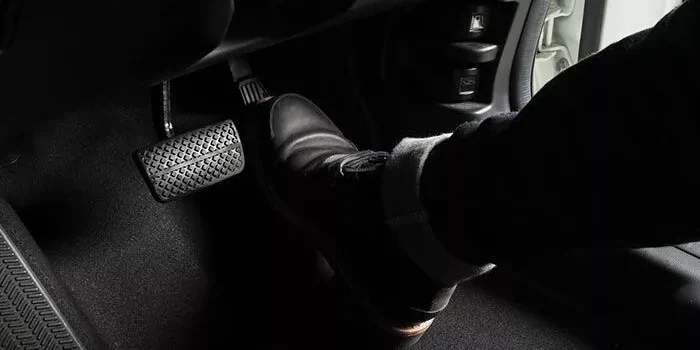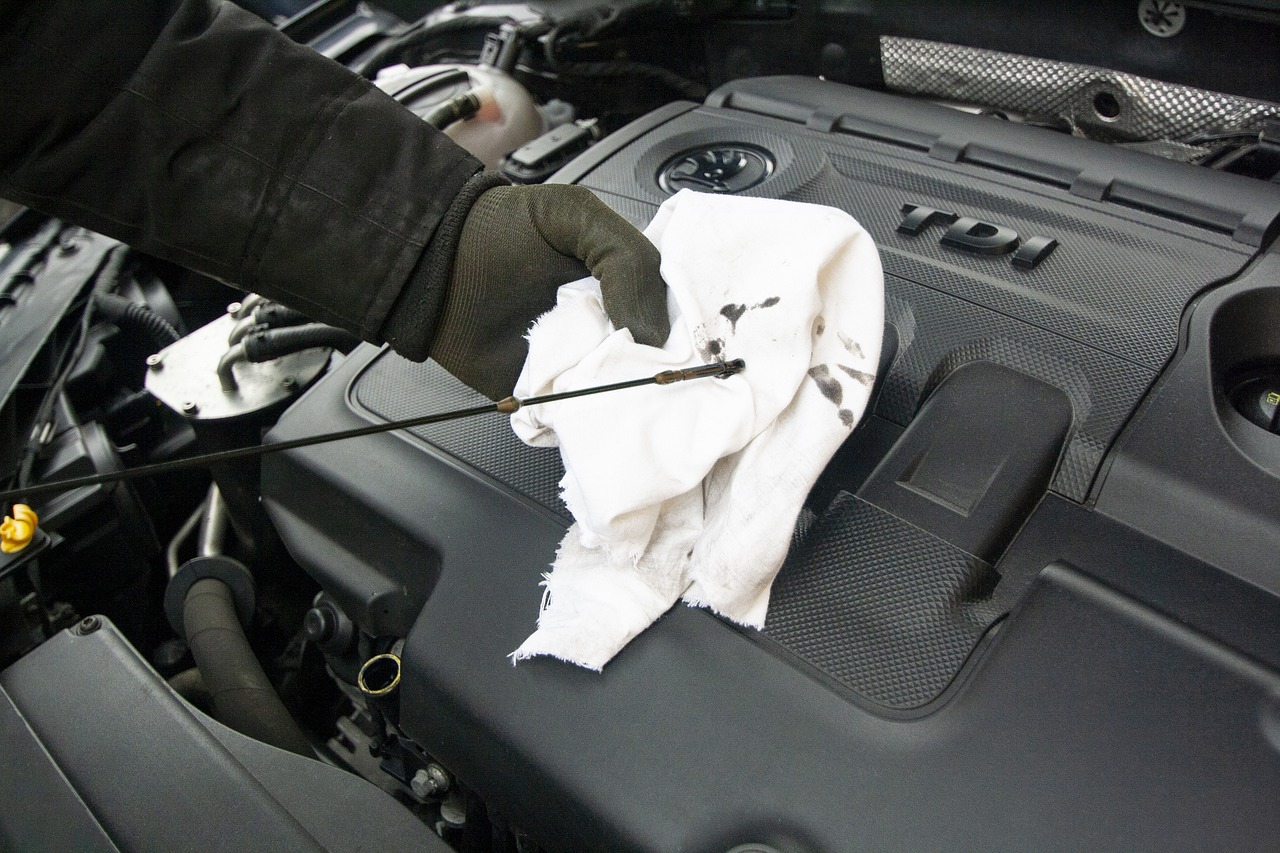Why Does My Car Thump When Accelerating


Reasons for Thumping when Accelerating
Thumping sounds while accelerating could be due to several reasons, but it is essential to identify the cause and rectify it before it escalates. Hitting a pothole or debris can cause misalignment of the wheels, which can ultimately lead to thumping sounds when driving.
Another reason could be worn shock absorbers, as they reduce vibration and the impact of bumps while driving, but if they are damaged, you may experience discomfort while driving. Low tyre pressure can also create thumping sounds as there will be less air in the tyres to absorb bumps on the road.
In addition, issues with the universal joints connecting the driveshaft may cause thumping noises during acceleration and deceleration.
According to CarBibles.com, “uneven wear of your car’s tyres causes a lot more problems than just annoying noise,” so remember to take this seriously.
Ensuring proper maintenance of vehicles through regular checks and servicing helps prevent such situations from arising.
Engine-Related Issues
To address engine-related issues with your car thumping while accelerating, you need to examine some key components. Dirty and clogged air filters, worn-out spark plugs, damaged ignition coils, faulty fuel injectors, and ignition timing issues could all be the culprits. Let’s take a closer look at these sub-sections to identify the root cause of your car’s thumping.
Dirty, Clogged Air Filters
When air filters become dirty or clogged with debris, it can lead to engine-related issues. Inadequate airflow can cause a reduction in engine performance and fuel economy. As a result, the engine might run rough or even fail to start. To prevent these issues, regular maintenance of air filters is crucial.
It’s important to understand that air filter replacement intervals vary based on driving conditions and vehicle make and model. Typically, manufacturers recommend replacing air filters every 12,000 to 15,000 miles or once a year. However, if you regularly drive in dusty environments or do a lot of stop-and-go driving, you may need to replace your air filter more often.
Poor air quality can also affect your car’s cabin air filter. If you notice musty smells or reduced airflow from your vents, it could be an indicator of a dirty cabin filter. It’s recommended that cabin filters be replaced annually or at every 15,000-mile interval.
One driver experienced engine problems due to a clogged air filter in his car. Despite regular oil changes and check-ups, the car ran poorly, had excessive exhaust smoke, and had poor gas mileage. A mechanic found that the issue was due to a severely restricted air filter, which was quickly replaced and solved all other related problems as well. Regular maintenance is essential for engines, especially monitoring the state of their filters, as this small component can cause significant damage if not kept up properly.
Worn-Out Spark Plugs
When the vital components of the ignition system, responsible for spark generation in combustion engines, go through wear and tear, it results in deteriorating performance. The diminished effectiveness of the engine caused by the disintegrated units affects fuel efficiency and, hence, causes several malfunctions in power production. Understanding the warning signs, such as difficulty starting your vehicle or diminished acceleration, can help prevent severe damage to your vehicle.
Inadequate spark plugs create an incomplete combustion cycle that leads to misfiring, stalling, and a significant decline in fuel consumption. Besides these early indicators, gradual worsening includes the extended time needed to start or idle loudly at stoplights. CoEmissions could also increase past standard limits if ignored over a longer period, leading to suboptimal performance. It is essential to analyse issues expediently and get alignments done regularly.
It is typically suggested that spark plugs be changed once every 30,000 miles, as recommended by various automakers like Toyota and General Motors. Ignoring this long-term maintenance could put stress on other aspects of the car and require more expensive repairs in the future, as per AAA’s report.
According to AAA’s study [1] dated May 2017, deteriorating spark plugs were present in 14% of cars more than ten years old, which prompted catastrophic failures resulting in costly repairs that might have been avoided with frequent alignment check-ups.
Damaged Ignition Coils
Ignition coil problems can be detrimental to engine performance. The malfunction of this component could lead to decreased fuel efficiency, engine misfires, and stalling. Additionally, when the ignition coils fail, it can cause damage to other engine parts, such as the catalytic converter. It is crucial to address any signs of a faulty ignition coil immediately to avoid further damage to the engine.
One particularly common issue with ignition coils is internal shorts caused by an electrical breakdown. This can result in uneven firing of spark plugs and erratic engine operation. Symptoms of a damaged ignition coil include rough idling, poor acceleration, reduced power, and poor fuel economy.
Replacing faulty ignition coils may seem costly, but it’s vital for vehicle maintenance. It’s important to note that while some generic or off-brand coils may offer lower prices, they are often inferior in quality and durability compared to OEM (Original Equipment Manufacturer) parts.
According to Consumer Reports testing, brand-name coils usually outlast cheaper alternatives by two or three times longer on average. While some third-party options may offer reliable performance, sticking with high-quality OEM parts ensures proper fitment and reliability for extended periods.
Source: Consumer Reports
Faulty Fuel Injectors
Fuel injector malfunctions can be a crucial issue for your car. This problem leads to inconsistent and inefficient combustion, poor engine performance, and high fuel consumption. Such a situation may require a precise diagnosis and repair by a certified mechanic.
In some cases, fuel injectors might not deliver enough fuel, resulting in rough idling or stalling. Additionally, over time, they may get clogged, causing leakage or a reduced spray pattern, ultimately leading to knocking noises from your engine or even permanent damage. Therefore, periodically checking the fuel system ensures the good performance of your vehicle.
It is worth noting that the lifespan of injectors is affected by driving habits, environmental factors, and the quality of fuel being used. Hence, one must be mindful before making decisions regarding maintenance frequency.
Studies by caranddriver.com have shown that dirty fuel injectors can reduce an engine’s power output by 2-3%, making it difficult to recognise a decline in performance over time.
Ignition Timing Issues
Timing discrepancies can cause crucial engine-related issues. When the timing of spark plug firing is not aligned with the engine, it results in ignition timing issues. This timing issue occurs due to various reasons, ranging from a faulty distributor cap or rotor to malfunctioning ignition coils or sensors. Ignition timing issues can lead to reduced power output and lower fuel efficiency.
Ignition timing issues are often caused by a misaligned crankshaft or camshaft position sensor or faulty spark plug wires. To diagnose the issue, mechanics undertake a visual inspection of the ignition system components and use an oscilloscope to monitor signals. Proper timing adjustments can rectify most of these issues. Similarly, replacing damaged spark plugs and cables could resolve it too.
Owners may also notice symptoms such as rough idling, stalling, poor acceleration, and decreased fuel economy that indicate ignition timing issues. Preventative maintenance by qualified technicians who possess specialised expertise in engine management has proven useful in reducing chronic problems.
Don’t let ignition timing issues decrease your vehicle’s performance; get regular inspections and necessary repairs done on time by professionals. A minor oversight in opting for preventive measures may lead to significant expenses later, along with endangering safety on roadways.
Transmission-Related Problems
To solve the transmission-related problems with your car thumping while accelerating, this section focuses on three sub-sections: low transmission fluid level, defective torque converter, and worn-out transmission mounts. Understanding these sub-sections will help you identify the root cause of the problem without needing a professional mechanic to diagnose it for you.
Low Transmission Fluid Level
Maintaining Adequate Transmission Fluid Levels:
Transmission fluid enables a smooth transition between gears and lubricates gears to avoid wear and tear. Inadequate levels of transmission fluid can cause serious damage to the vehicle’s transmission system. Insufficient amounts of transmission fluid may lead to slipping, hard shifting, overheating, stalling, and reduced fuel efficiency.
Moreover, low levels of transmission fluid can arise due to several reasons, such as leaks or evaporation. Drivers must ensure routine checks on their vehicle’s transmission fluid levels through the use of a dipstick located below the hood. Neglecting this essential maintenance procedure leads to costly repairs or replacements.
Drivers should be aware that although some vehicles have no set requirements for regular flushing or changing of transmission fluids, it is necessary from time to time.
In fact, according to Consumer Reports (an American magazine), regularly flushing results in extending the life span of a car’s automatic transmission by 100,000 miles.
Defective Torque Converter
A malfunction in the mechanism that regulates the torque between the engine and transmission can cause disruptions in the proper functioning of a vehicle. These irregularities can give rise to an issue known as a ‘faulty torque converter.’ Let’s delve deeper into this problem.
| Effects | Causes |
| Slipping, overheating, rough shifting, and unusual noise from transmission | Contamination, wear and tear of components, chemical degradation of automatic transmission fluid (ATF), insufficient fluid levels or pressure |
A defective torque converter may be caused by multiple reasons, such as contamination, wear and tear of components, chemical degradation of ATF, or insufficient fluid levels or pressure. These factors can lead to slipping, overheating, rough shifting, and unusual noise from transmissions. Vigilant attention is required to prevent further damage to other parts like gears, bearings, etc. Proper maintenance will reduce downtime and repair costs while ensuring that your vehicle remains in good condition.
Don’t disregard any signs of malfunctioning! Schedule regular maintenance checks with professionals to keep everything running smoothly.
Worn-Out Transmission Mounts
When the supports that keep the transmission system in place become worn out, it can result in various problems. With such primary components being faulty, you may suffer from various malfunctions in your vehicle. Not only will you hear a loud and annoying grinding or knocking sound coming from underneath your car, but you may also experience rough shifting or even notice an unpleasant vibration while driving.
These transmission-related issues can significantly impair the performance of your vehicle and compromise its safety. When the worn-out transmission mounts fail to hold the powertrain securely, it may move around violently as you accelerate or turn corners, which can create dangers on the road.
If left untreated for a long time, these transmission problems may escalate rapidly and lead to further complications, leaving you with no other option than to replace significant parts of your system entirely.
Once you detect any sign of worn-out transmission mounts, bring your vehicle to a reputable auto mechanic who has extensive knowledge of fixing transmission systems. They can help identify the specific issue and offer recommendations tailored to suit your budget based on how advanced the problem is.
For instance, if it is just excessive wear and tear on the mounts due to age, replacing them might be all that is necessary. However, if other related components are already damaged beyond repair, they may need to be replaced too. In summary, timely detection of worn-out transmission mounts is critical to preventing dangerous situations on the road.
Suspension-Related Causes
To address suspension-related causes behind your car thumping when accelerating, turn your attention to worn-out steering components, damaged shock absorbers, and worn-out bushings. These sub-sections provide potential solutions to your car trouble and can help you understand the possible sources of discomfort while driving.
Worn-Out Steering Components
The steering system’s wear and tear can lead to suspension-related issues. Worn-out steering components like the steering rack, tie rod ends, and ball joints can cause uneven tyre wear, play in the steering wheel, and a drifting steering wheel. These symptoms can negatively affect vehicle handling and increase the risk of an accident. It is crucial to recognise these signs early on, before other suspension components are affected.
A worn-out steering system can lead to severe suspension-related issues that should not go unchecked as they risk compromising the safety of your vehicle. The steering rack, tie rod ends, and ball joints are integral parts that require routine maintenance checks. If ignored, they will eventually reduce a vehicle’s ability to handle it precisely while driving and increase its chances of a wreck.
Performing regular maintenance checks on suspension components is highly recommended by most automobile experts, like Motor1.com. According to them, performing such preventative measures could save you from accidents caused by broken suspensions or control arms stripped off their bolts at high speed.
Damaged Shock Absorbers
When the shock absorbers of a vehicle are compromised, it can lead to suspension-related issues. Damaged or faulty shock absorbers can cause uneven tyre wear, reduced handling capability, and a rougher driving experience. The role of the shock absorber is to ensure the smooth transfer of energy from the road into the vehicle’s frame, thus preventing any unnecessary bouncing or swaying. When this critical component fails, it can lead to more severe damage throughout the suspension system.
In addition to causing discomfort while driving, worn-out shock absorbers can also negatively impact braking distance and create instability in high-speed situations. Unfortunately, many drivers overlook issues related to their suspension until it’s too late. If you hear clunking noises or feel increased vibrations while operating your vehicle, it is advisable to seek professional assistance immediately.
A contributing factor to damaged shock absorbers may be overloading a vehicle beyond its recommended weight capacity repeatedly. Scenarios such as continuously going over speed bumps at an excessive pace or regularly travelling over roads replete with potholes have been found to cause significant harm.
One notable instance where problematic shocks were ignored led to a race car driver named Jesse Combs being tragically killed when she attempted to break her own land speed record in 2019. Reports following her fatal crash revealed that one of her car’s front suspension pieces broke apart due to previous damage that had gone unnoticed and unrepaired.
Worn-Out Bushings
The wearing out of rubber or polyurethane components inside a suspension system known as ‘bushings’ can have a significant impact on vehicle handling and stability. These components are responsible for absorbing shocks caused by bumps and dips in the road to keep the tyres in contact with the ground, enhancing traction control, and reducing noise. Wearing out of bushings can lead to increased vibration and tyre shake while driving, causing uneven steering and poor ride quality.
If left unattended, worn-out bushings could eventually fail, leading to decreased suspension performance and increasing the chances of losing control during severe cornering. Mechanics often recommend replacing these components after extended use or when they exhibit visible signs of damage like sagging, ripped casings, or appearing loose.
Moreover, neglecting to replace these worn-out bushings may cause further problems, such as reduced effectiveness of anti-roll bars, as it will put more stress on them than distributing them correctly amongst the other parts.
Reports suggest that cars commonly require new bushings around 80k miles; however, it varies depending on factors such as usage patterns and terrain conditions.
Tire-Related Factors
To troubleshoot why your car thumps when accelerating, let’s explore the tire-related factors. Check for tyre pressure irregularities and uneven wear on tyres.
Tyre Pressure Irregularities
Maintaining Optimal Tyre Pressure
A key aspect of tyre care is maintaining optimal tyre pressure. Failure to do so results in tyre pressure irregularities that can have serious safety implications. These include underinflation, overinflation, and uneven tyre pressure distribution.
| Irregularity Type | Cause | Effect |
| Underinflation | Inadequate inflating frequency or leakage |
|
| Overinflation | Inflating beyond recommended inflation pressure or excess heating while driving |
|
| Uneven Pressure Distribution | Misalignment, suspension issues and other mechanical problems |
|
Aside from these common irregularities, seasonal shifts in temperature and altitude changes can also cause fluctuations in tyre air pressure. This can lead to improper alignment, tread depth variations, decreased fuel economy, and reduced overall stability while driving.
To avoid costly repairs or life-threatening accidents caused by tire-related issues like these, drivers must prioritise proper maintenance and routine inspections.
Ensure you know how to take care of your tyres. Don’t put off making sure they are always in top condition. Schedule regular check-ups and maintenance so you don’t miss out on the safety and performance benefits that come with maintaining optimal tyre pressure.
Uneven Wear on Tyres
Uneven Pattern Variation in Tyre Treads
Tyre wear is a natural phenomenon where the tyre gradually loses tread depth. However, unexpected variations in the pattern of wear can be a cause for concern as they indicate underlying issues that require attention. Here are some insights into uneven wear on tyres:
- Overinflation or underinflation: Low pressure can lead to excessive shoulder wear, and high pressure can lead to excessive centre wear.
- Misaligned wheels: Camber, caster, or toe misalignment can cause diagonal or feathering wear patterns.
- Lack of rotation: Without proper rotation, tyres will experience more stress and weight distribution, leading to faster and irregular tread wear.
- Worn suspension components: Damaged shocks, struts, or bushings can lead to cupping or scalloping.
It is important to identify the source of the uneven tyre wear pattern early because it not only affects traction but also hampers fuel economy and safety on the road.
Regular inspection of tyres by a qualified mechanic can address these concerns before irreparable damage occurs.
Did you know that uneven tyre wear patterns were one of the contributing factors to NASCAR’s decision to switch from a bias-ply construction tyre in 1989? The radial construction tyre allowed for more predictable and consistent handling characteristics despite aggressive driving styles.
Why Does My Car Thump When Accelerating – Final Thoughts
Key Insights
In summary, thumping when accelerating can indicate various underlying issues, such as worn-out engine mounts and damaged drive shafts. It is best to seek professional inspection to diagnose and address the problem effectively. In addition, proper maintenance and prompt repairs can prevent further damage and ensure optimal vehicle performance.
Key insights include checking for any unusual sounds or vibrations during acceleration, monitoring the transmission fluid levels and condition, and inspecting the tyres for wear or damage. Ignoring thumping when accelerating can lead to serious safety hazards and costly repairs in the long run.
It is worth noting that some vehicles may experience natural thumping when shifting gears due to their design or transmission type. However, if the thumping is excessive or accompanied by other symptoms such as loss of power or stalling, it is advisable to have a mechanic look into it.
A true fact: According to AAA, about one-third of US drivers postpone recommended vehicle maintenance and repairs until it’s too late.
Why Does My Car Thump When Accelerating – Frequently Asked Questions
1. Why does my car thump when accelerating?
A: A thumping sound when accelerating could be caused by various reasons, such as worn-out suspension, loose or damaged engine mounts, or damaged tyres. It is best to have your car inspected by a mechanic to determine the cause of the thumping sound.
2. Can driving with a thumping noise cause more damage to my car?
A: Yes, driving with a thumping noise can cause additional damage to your car. Ignoring the problem can lead to more severe and expensive issues over time. It is best to have your car inspected immediately when you notice any unusual sounds or vibrations.
3. How much does it cost to fix a thumping noise when accelerating?
A: The cost to fix a thumping noise when accelerating will vary depending on the cause of the problem. It can range from a simple fix, like tightening a loose engine mount, to more complex repairs, like replacing worn-out suspension components. It is best to bring your car to a trusted mechanic for an accurate diagnosis and estimate.
4. How long can I drive with a thumping noise?
A: We recommend not driving with any unusual noises or vibrations, as they can cause further damage to your car. It is best to have it inspected and repaired as soon as possible. It could be a minor issue that can be easily fixed, or it could be a warning sign of a serious problem that needs immediate attention.
5. Can a thumping noise be a sign of a transmission problem?
A: Yes, a thumping noise can be a sign of a transmission problem. It could indicate that there is an issue with the gears or a worn-out transmission mount. If you suspect that your transmission is causing the thumping noise, it is best to bring your car to a mechanic for diagnosis and repair.
6. Can bad tyres cause a thumping noise when accelerating?
A: Yes, bad tyres can cause a thumping noise when accelerating. If your tyres are worn out or damaged, they can cause vibration and noise while driving. It is important to regularly check your tyres for damage and wear and have them replaced as needed.










